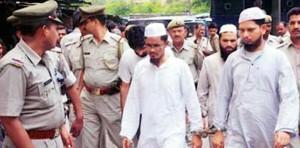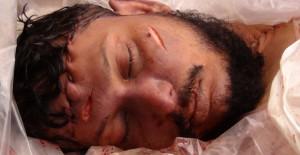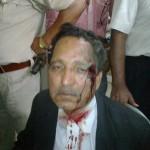Tariq Qasmi-Khalid Mujahid case: ‘Collusion’ among the Police, Government and the Lower Court exposed!
By Fazlur-Rahman
Published in Inquilab on 22 May 2013
|

Lucknow: How the case about the arrest and trial of Tariq and Khalid is being tried in the local court of Barabanki with the collusion between the police and the state government is being exposed slowly after the mysterious death of Khalid Mujahid. The trial shows a set pattern of the lower court’s attitude, prosecution lawyer’s behaviour of not wavering at all from the instructions received from the ‘masters’ through the police, also shows that there has not been a fair hearing in the lower court. There is a plethora of carelessness and wilfulness in this case that started on 12 December 2007 from Madiyahu. After the exposure of the “collusion” among the Police, state and the lower court, preparations are underway to take the case to the High Court where a petition will be submitted to form an SIT to investigate the case under the supervision of the High Court.

In the Court of Special Session Judge (SCST) Barabanki where the case of arrest of Tariq Qasmi and Khalid Mujahid (now deceased) is being tried, Judge Kalpana Mishra refused to accept an application from Asad Hayat advocate as an independent witness, who happens to be the eye witness of the kidnap of Khalid Mujahid from Madiyahu, district Jaunpur. Under the law courts are obliged to hear submission put before it by anyone whosoever. However in this instance when a letter from District Magistrate Barabanki to withdraw the case was presented, a petition to oppose this motion by an unconcerned lawyer was readily accepted by the court.

One may call it carelessness by the district authorities of Barabanki or something else, notwithstanding government’s letter from District Magistrate Barabanki was presented as was and no affidavit was attached with it. At the time of presenting the application the prosecution lawyer did not present any argument though he is supposed to represent government’s point of view only. Greatest carelessness was committed by the government of Uttar Pradesh who applied to the court for withdrawal of the case under Section 321 of the Criminal Code instead of Section (8)/173. Section (8)/173 says that after submission of the charge sheet, if the investigative officer finds any proof of the innocence of the alleged or a proof of crime then in both such cases he has to submit a supplementary report under Section (8)/173. If a proof of innocence us found then the investigative officer will apply to withdraw his first report by mentioning weaknesses in his first charge sheet and will submit a supplementary report. Contrary to this withdrawal of a case under clause 321 wholly depends upon the court’s own opinion.
It is learned that investigative police officer of ATS Rajesh Kumar Srivastiva had on 15 March 2008 after scrutiny filed a charge sheet in the Barabanki court against Tariq Qasmi and Khalid Mujahid. According to the Nimesh Commission Report and eye witness accounts this charge sheet is one sided. If the investigative officer examines his report in the light of the points stated in the Nimesh Commission Report, then he would also gather evidence as well and thus the dimension of the investigation will go on expanding.
At the arbitration hearing of the suspicious death of Khalid Mujahid those people were allowed to be there who are closely related to the Samajwadi party and the government. The night before the DM had said that lawyers of the accused or any of his relations can be present at the arbitration hearing if they want to do so, but by the next morning his stand got changed and no ‘other’ was allowed to be present at the hearing. No one even cared to wait for the Family members of the deceased to arrive at Barabanki district hospital. Video graphy of the post mortem was arranged but camera was not allowed to zoom in so that wounds and injuries could clearly be visible.
Advocate Shoaib, lawyer of the deceased says that after his appearance in the Faizabad court along with other accused, when the deceased left from Faizabad he was wearing Kurta and pajama but after the news of his death when his lawyers, along with community workers and relatives arrived at Barabanki district hospital they found him clad in t-shirt and lower and kurta pajama was not there. In order to have his statement regarding the death of Khalid Mujahid recorded Tariq Qasmi was taken to the kotwali (police station) and was presented before the media. As reported he was made to state that Khalid Mujahid had been unwell for many days, although just after this statement, one officer of Lucknow district jail said that Khalid Mujahid was not ill.
Eye witness of the abduction of Khalid Mujahid from Madiyahu, advocate Asad Hayat said that on 19 March 2013 he had submitted an application to the Special Session Judge Barabanki, Kalpana Mishra and along with his affidavit he had also attached a copy of Nimesh Commission report. In his application he had written that ‘I am an eye witness of how on 12 December 2007 when Tariq Qasmi was going to attend a Tableeghi Ijtima he was forced out of the jeep of Jamiatul Rashad at Rani Sarai Azamgadh by some plain clothed men and was thus “abducted”. Later it was discovered that those men were from STF.’ Asad Hayat requested the court to register his witness report and summon Hon’ble Justice Nimesh and secretary of state for home affairs with the Commission Report. All those witnesses who have so far been presented in the court should also be summoned so that it could be determined whether the arrest was wrong or not. In the application it was also alleged that through official collusion this case is being tried. Special Session Judge returned the application instructing the applicant to submit it through prosecution lawyer. On the other hand the prosecuting lawyer told the Judge that the applicant is not a witness in this case. Section 311 of the Criminal Penal Code, however says that any person at any stage of a case can present himself as a witness and the court will have to see whether his statement carries any truth in it or not and in this light the court will have to decide about that application.
